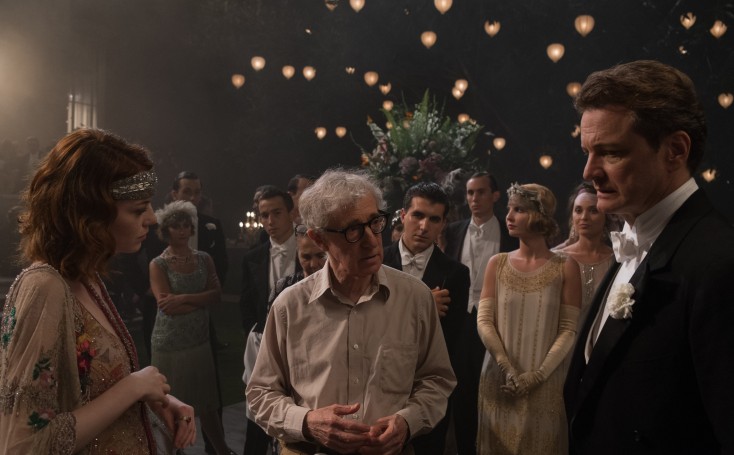
Emma Stone as Sophie and Colin Firth as Stanley in Woody Allen’s MAGIC IN THE MOONLIGHT.
©Gravier Productrions. CR: Jack English.
By ANGELA DAWSON
Front Row Features
NEW YORK—While Woody Allen’s new film, “Magic in the Moonlight” appears to be simply another European-set period romp starring dashing English actor Colin Firth and pretty ingénue Emma Stone, upon closer examination, the feature turns out to be a dissertation on the filmmaker’s grim practical view of the world.
During a recent press conference here in Allen’s home turf, the filmmaker explained—albeit in his humorous way—how the characters—Firth’s is a skeptical magician and Stone’s is a psychic—represent faith versus science.
Initially, Firth’s character, a 1920’s-era magician whose hobby is debunking mystics and psychics, plots to debunk Stone’s Sophie, who claims to be clairvoyant. But as Stanley gets to know the pretty redhead amidst the luxurious estates that dot the hillsides in the south of France, he begins to fall in love with her and wants to believe that Sophie’s psychic powers are real. When the truth emerges, Stanley has to reconcile what he wants to believe and the reality of the situation.
Allen, 78, pulls no punches as he explains the thought-process that went into writing and directing the film, and how “Magic in the Moonlight” is just one more diversion to keep audiences from facing the dark realities of the world.
Q: How did you come up with the story for this film?
Allen: Magic has always been a great interest of mine. I was an amateur magician when I was young and I used to practice a lot and would read up on it a lot. I’m well aware of the history of magic, and reading about it during the teenage years at the turn of the century into the ‘20s, there was an enormous amount of great vogue in fraudulent spiritualism in the United States and abroad as well. Many magicians, among them Houdini, the most renowned used to debunk them. (These magicians) took great pleasure in exposing them because they were fraudulently deceiving the public and stealing money from them. So, that’s led me to the idea. I thought it would make an interesting romance between a fraudulent little mystic and a magician, who had a much more sober view of the world.
Q: Can you talk about casting your leads?
Allen: Colin was the perfect person to play this, because it requires a certain savoir-faire and you want an elegant, good-looking person who can do the wit and can have that attitude, without getting on your nerves, and someone you’d like to watch for the whole movie. Emma, I had just seen on the treadmill, frankly. She did these movies I’d never watched but when I’m on my treadmill in the morning, I’m surfing through, to kill the time, and suddenly I’d see five minutes of this or five minutes of that, and I’d think, “ Who’s that girl?” in this adolescent or post-adolescent movie, and I mentioned her name to (casting director) Juliet Taylor, who said, “She’s not just a pretty face. She’s a very very good actress.” So we had her in and she was very intelligent to chat with, and so I cast her. She did such a good job, she’s in the movie I’m doing now.
Q: You’ve said, “I make escapist films but it’s not the audience who escapes, it’s me.” Do this film and the next one serve as an escape?
Allen: I’ve been escaping my whole life. Since I was a little child I escaped into the movies on the other side, as an audience member. I escaped by going and sitting in the movies all day long. Then, when I got older, I escaped into the world of unreality by making movies. So I’ve spent 45 years escaping into movies but on the other side. When I get up in the morning and go in and work with beautiful women and charming men and funny comedians and dramatic artists. I’m presented with costumes and great music to choose from and sets and I travel to certain places. So, for my whole life, I’ve been living in a bubble, and I like it. I’m like Blanche DuBois that way. I prefer the magic to reality and have since I was five years old, and hopefully I can continue to make films and constantly escape into them.
Q: Why do your protagonists often seem to be neurotic people who find life meaningless?
Allen: Because I firmly believe, and I don’t say this as a criticism, that life is meaningless. I’m not alone in thinking this. There have been many great minds far superior to mine that have come to that conclusion both early in life and after years of living. Unless somebody can come up with some proof or example where it’s not, then I think it is. I think it’s a lot of sound and fury signifying nothing. I’m not saying that one should opt to kill oneself but the truth of the matter is, when you think of it, certainly every 110 years, there’s a big flush and everybody in the world is gone, and it’s a new group of people. And that gets flushed, and there’s a new group of people. This goes on and on interminably toward no particular end, for no rhyme or reason. The universe, as you know from the best physicists, is coming apart and eventually there will nothing. It’ll be much earlier than you think, really, because the sun is going to burn out much sooner than the universe will vanish. There will be absolutely nothing—no time, no space, nothing at all. That’s why, over the years, I’ve never it’s written or made movies about political problems because while they do have current critical importance, in the large scheme of things, only the big questions matter, and the answers to those questions are very depressing. What I recommend is distraction. To be honest, I portray my characters with this feeling.
Q: It seems like you have magic in every film you’ve done. Are you trying to find magic in your life?
Allen: It’s the artist’s job, or at least it’s my job, to try and find some solution or some reason to accept things but given the grimmest reality. I feel the grimmest facts are the real facts. You are you born, you suffer, you die, and it’s to no purpose. You’re gone forever and ever, and that’s it. Facing that massive overwhelming bleak reality, to find a reason to cope with that, I feel it’s the artist’s job to do that. I’ve thought to myself at times, there’s a story in two filmmakers: one makes films that are deep, intellectual, profound and confrontational and the other one makes purely vacuous escapist films. I’m not sure if the one who makes the escapist films is not making a bigger contribution than the one that makes the deeper films. You’re in the world and all these terrible things are going on and then you go into a dark room, the movie theater, and you’re there for an hour and a half, and Fred Astaire is dancing, and it’s like drinking a cold lemonade on a hot day. You’re refreshed, and then you walk back out into the terrible world. The artist can’t give you an answer that is satisfying to the dreadful reality of human existence. So the best you can do is entertain people, and refresh them for an hour and a half and they can go on and meet the onslaught until they’re sunken and crushed, and then somebody else comes along and picks them up a little bit.
Q: This film is about reality versus illusion. You also deal with the reality of love verses the illusion of love? Was that in the back of your mind while you were writing the script?
Allen: I’m all for illusion, as you can tell from what I’ve been saying. For me reality is a painful grind. I think it is for everybody, regardless of whether one is rich or poor. In the end, I’m going to quote myself here, there was the line I had in a movie—I can’t remember which movie it was—but it was, “We all know the same truth. Our lives depend on how we choose to distort it.” (It was from his 1997 film “Deconstructing Harry.”) That’s how I feel. I’m all for illusion. I’ve done this before in films. Colin’s character is called an illusionist and he creates these illusions. I feel that’s the only thing that can possibly save us from the plight—that we’re all in is some kind of act of magic. And, if it doesn’t happen soon, it’s a grim situation. So I am obsessed with that subject.
Q: How did you keep Colin’s character engaging with audiences, because he could turn off some people with his sarcasm?
Allen: In the history of theater and film, people do like sarcastic characters, and they do like curmudgeons. If they’re amusing, they do like them, despite the fact that they’re vitriolic, particularly if they’re for the right thing. I thought the character Colin is playing wants nothing more than to be wrong. He wants nothing more than to find out that there is more to life and that he’s wrong and that Emma is right. There are things that are unknown to us and magical and amazing and we don’t have all the answers. The truth is pretty much what you see is what you get. As soon as he is deceived into thinking that there may be some purpose or magic or underlying mystical meaning, it changes him completely. He smells the flowers and he loves everything. It gives you a purpose in life.
Q: Is his character like you?
Allen: I was once on a television panel with Billy Graham and I said, “What if when you die you find out I was right and there is nothing,” and he said to me, quite correctly, “I will still have had a better life than you.” He’s right because I’ve had a life riddled with anxiety, doubt, questions, and he would have had a life of complete confidence, that he’s being protected and there’s an afterlife. He went through life happy and secure, assuming he really felt that way, which I guess he did. So Colin’s character wants nothing more than to be changed and to find out that he was wrong, and it’s great for a while, but his happiness is predicated strictly on being deceived, just as I feel the person who puts his or her faith in religion or some other life-affirming nonsense so they can take it, is really deceiving themselves. You want to be able to say to yourself: what I see is what I get. This is it. The facts are in pretty much there, and they’re not good, but I’m still going to go on and try to make a life and find some reason to be affirmative. It’s not easy, let me tell you, but it has to be done without self-deception. Only when Colin is deceived is he happy. When he’s not deceived, the best he can hope for, as he expresses in the movie, is the same grim reality but with the occasional oasis here and there. One of these oases is Emma, and being in love with her. It does give you some little respite from the terrible world.





